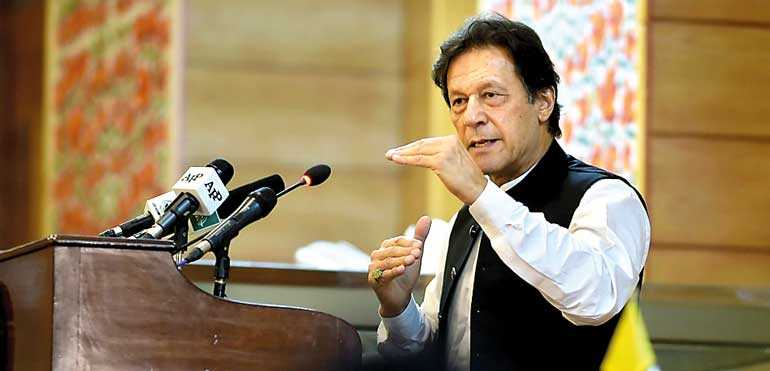Sunday Feb 22, 2026
Sunday Feb 22, 2026
Thursday, 15 August 2019 00:00 - - {{hitsCtrl.values.hits}}

Islamabad/Karachi (Reuters): Pakistan Prime Minister Imran Khan used an address celebrating Independence Day on Wednesday to accuse India of planning military action in the disputed Kashmir region that has long been a flashpoint between the two nuclear-armed neighbours.
India revoked the special status of its portion of Himalayan Kashmir, known as Jammu and Kashmir, on 5 August, and moved to quell widespread unrest by shutting down communications and clamping down on freedom of movement.
Islamabad retaliated by suspending bilateral trade and all public transport links with India, as well as expelling New Delhi’s Ambassador to Islamabad.
On Wednesday, Khan travelled to Muzaffarabad, capital of Pakistan-administered Kashmir, making his first visit to the region since becoming Pakistan’s leader in 2018.
In a speech, he told the region’s Parliament that India planned more extensive action than that of February, when its fighter jets struck inside Pakistan, following a dramatic escalation in tension between the rivals.
“They have made a more horrendous plan to divert world attention from their move in Kashmir, they plan action in Azad Kashmir,” Khan said, referring to the portion held by Pakistan.
“The Pakistani army is fully aware that they (India) have made a plan of taking action in Azad Kashmir.”
Khan also repeated comments comparing the Rashtriya Swayamsevak Sangh, the ideological parent of India’s ruling Bharatiya Janata Party, to the German Nazi Party.
Representatives of India’s armed forces and its foreign ministry did not immediately respond to requests for comment on Khan’s remarks.
Conflict zone
India rules the populous Kashmir Valley and the Hindu-dominated region around Jammu city, while Pakistan controls Azad Kashmir, a wedge of territory in the west. China holds a thinly populated high-altitude area in the north.
India and Pakistan have fought two wars over Kashmir since gaining independence from colonial power Great Britain in 1947. They came close to a third in February, after a deadly attack on Indian police by a Pakistan-based militant group resulted in air strikes by both countries.
India’s revocation of special status for Jammu and Kashmir blocks the state’s right to frame its own laws, and allows non-residents to buy property there.
Prime Minister Narendra Modi’s government has said old laws prohibiting people from outside Kashmir from buying property, settling there, and taking up government jobs had hindered its development.
Restrictions were lifted in five districts of Jammu and nine districts of Kashmir on Monday, India’s home ministry said, adding that security would be heightened for both countries’ Independence Day celebrations and Muslim Friday prayers.
In Islamabad, posters urged residents to express solidarity with Kashmiris and roadside vendors sold Azad Kashmir flags as well as the Pakistan flag commonly displayed on 14 August.
“Independence Day is an opportunity for great happiness, but today we are saddened by the plight of our Kashmiri brothers in occupied Jammu and Kashmir who are victims of Indian oppression,” Khan said in an earlier statement. “I assure my Kashmiri brothers that we stand with them.”
Pakistan has also said it will observe India’s Independence Day on Aug. 15 as a “Black Day” this year, with flags flown half-mast on government buildings in protest at India’s decision.